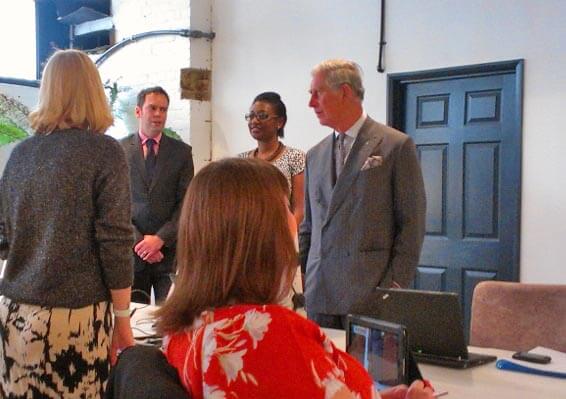What follows is a true story. It’s one small example of the casual sexism I faced when I gave up full-time employment to become the main carer for my kids and it partly inspired me to start Dadbloguk.

It was late summer in 2012 and I was in Croydon, South London. There’s a whole back story I won’t go into, but Prince Charles and the Duchess of Cornwall were paying the area a visit.
Although mine was simply a bag-carrying role, I was, along with a selection of local business people, there to meet The Prince and Duchess. Among the business folk was an individual who had set up a childcare operation.
Her business model offered short term childcare to mums, essentially a creche that kids could be left at as mums went shopping. Emphasis on mums, a fact she made a great deal about. At one point during this regal event, I politely suggested dads might want to use her service as well. While she agreed dads could use the service, she was incredibly dismissive of the idea.
Shortly afterwards, the local newspaper ran an absolutely massive online article about this fledgling business. The proprietor was extensively interviewed, repeatedly stressing her childcare facility was available to “mums,” not once mentioning or even suggesting fathers could or should pay to use it.
This was a very shortsighted approach. The previous year I had given up full-time employment to concentrate on family and home while my wife worked full-time and fulfilled the traditionally male breadwinning role. If there was one struggle I was only too familiar with, it was going shopping and juggling kids in the supermarket aisle. This childcare service appealed to me, and I was, at that time, a regular visitor to Croydon. Unfortunately, I didn’t feel welcome using it. As I say, this was just one of several similar incidents, but it’s no coincidence Dadbloguk was born a couple of months later to air my frustrations at the way fathers could be so casually dismissed.
As my kids have got older, I’ve become used to dealing with various childcare settings and providers. Over time my employment status has changed too. I’ve worked part-time, been a stay at home dad and these days I work for myself but fit my work around family life as I’m still the kids’ main carer. As the children have developed and as my employment status has changed, we’ve made use of nurseries, childminders, school holiday camps, babysitters, breakfast clubs, after school clubs and so on.

I’ve also seen huge debate and discussion between policymakers about childcare. All too often they make the same mistake as the childcare practitioner I met in sunny Croydon: They treat childcare as a women’s issue.
If childcare is treated as a women’s issue, it will always remain a women’s issue. Men will not recognise childcare’s importance and will not engage with debate about the subject. The only group of politicians who will show any interest in it will be the Women and Equalities Select Committee. What we need to do is get it on the agenda of the All Party Parliamentary Group on Fatherhood as well.
This is not to ignore or downplay the many issues mums face when trying to secure good quality childcare for their offspring. As is blatantly evident, the world is set up in a way that men are encouraged back to work swiftly after a child is born, all too often leaving mum holding the babies and wondering if she will ever have a career or job again. This is desperately unfair, but if only women engage in this discussion, the solutions will be focused on women. There’s then a danger the status quo will become even more entrenched. Instead of creating a childcare system that benefits all families, working parents, non-working parents, all genders and, most of all, children, we’ll have one that mostly benefits women leaving them as main carer for the kids when they may not want to be and leaving men with less opportunities to take on the main caregiving role.
The challenge is to get men discussing childcare, to make them appreciate it is an issue that massively affects them, the women in their lives and their children. I’m not saying men aren’t partly to blame for their lack of engagement on this issue. While some men know the childcare system inside and out, there is, sadly, a population of dads who simply don’t see childcare as a man’s job. A big issue, however, is that men are rarely invited to the party.
Last week, I noticed something very interesting in my twitter timeline. It was a tweet from the Fatherhood Institute asking men to complete a survey about their experiences of using childcare.
To use a cricketing term, I followed through, completed the survey and discovered it had been set up by Mumsnet. Various other organisations are involved including the Trade Union’s Congress, Pregnant Then Screwed, Maternity Action, Working Families and so on. The Fatherhood Institute is the only men’s interest group working on this survey so there’s still a bias towards groups focused on women, but at least they’re on board. This is progress!
I implore all men reading this to take part in the survey. Click on the badge below and fill it in. Your voices must be heard. The point has to be made that childcare is a subject that affects men and one they should be interested in.
Based on my experiences, I highlighted the following issues with the childcare sector in the UK. Have a read and see what you think.
Men can be more reliant on paid childcare than women
Let me get right in there with my most contentious argument: Men can be more reliant on using paid childcare than women because of the lack of informal support networks available to them.
I have a challenge for any mum reading this. When was the last time you offered to help another mum out with childcare? When was the last time you agreed to look after another mum’s child for a couple of hours after school?
Conversely, have you ever offered to help a dad out? I would wager many mums have helped out a fellow mum, but few could honestly say they’d assisted a dad in crisis.
When I mention this to people, the common reply is: “Well why don’t you ask one of your dad friends to help you out?” Most dads have a totally different mentality because they work full time. When I was younger and less experienced at this fatherhood thing, I did on a few occasions ask for help from dads I knew, full-time working dads because these were the only men I knew. The question simply did not compute. I quickly learned that unless a dad has significant responsibility for childcare, there is no point asking him. Such men exist, but they are thin on the ground.
Thinking explicitly about informal support networks, mums are encouraged from before a child’s birth to socialise with other mums. Think back to all those NCT jamborees you probably attended. Sure, the occasional event is held to include dads, but they are very much an ‘add-on,’ a ‘nice to have,’ a bit patronising to be honest with you, as if showing up at these events and sinking a couple of Budweiser’s with the men makes you an involved dad.
By the time a child arrives, the mums have often forged friendships and created support networks. These bonds are strengthened at nursery and again at the school gate and it’s difficult for a dad to be accepted in these tight social circles.
There are other social barriers to overcome. Mums and dads are not always comfortable offering help to each other. Having dealings with someone of the opposite sex beyond the school gate can lead to suggestions or rumours of impropriety. Alternatively, it can just feel awkward.
I’m guilty of this. Despite being the main carer of my kids for a decade I still get really nervous about approaching a mum I don’t know. I’m just never sure what reaction I’m going to get
If I think about my own experiences, all of the above issues have made me more reliant on paid childcare than most mums. I’ve simply had no informal networks to call upon and so I’ve had to pay for childcare when I’ve needed it.
Childcare is rarely flexible
Childcare is rarely flexible and most childcare providers struggle to fulfill the needs of a customer like me: A gig-economy freelancer who can sometimes need childcare at just a day or two or even a few hours’ notice. Most parents, be they a working mum, working dad or not in employment will experience something unexpected and need childcare at short notice at some point.
I am well aware that highly flexible options exist in the trendier parts of London. Good luck to you if you live in Motherwell, Bolton or rural Devon.
I can think of one nursery that my children used to attend that had caught up with the times to some degree. You were able to book childcare on an hourly basis, but only if they had capacity. It generally worked very well, but as I say, if they were already full or they didn’t have the right number of staff working that day, you were stuffed.
I have previously approached childminders and explained my unpredictable employment situation. Some have been very good, but many simply aren’t interested in a client like me because they often work as a childminder fitting it around their own family commitments. They generally don’t like last-minute, unplanned work so this form of childcare hasn’t always been a viable option.
As for breakfast and after school clubs, oh my word, the “computer says no” culture seems to be rife in this sector. This model of childcare is set up for people who work 9-5, Mon-Fri and decreasing numbers of people have such reliable work patterns. In my experience it is simply not set up to handle ad-hoc or last minute childcare requests. You seem to have to submit a signed request in triplicate, three months in advance to the Workers Party of the Democratic People’s Republic of North Korea and hope that Kim Jong-Un himself agrees your children can have 1.5 hour’s worth of childcare on a wet, Tuesday afternoon.
Okay, I exaggerate, but only slightly. I’ve had numerous bad experiences with wrap-around childcare, the highlight being the time I was told my daughter would get breakfast when I dropped her off one morning, only to find out she had never been given any food because breakfast wasn’t even an option.
I am a big fan of the early years and childcare sectors. I think they do a lot of great work but for me, lack of flexibility are the sectors’ biggest failings. The number of freelancers, home workers and gig economy workers has boomed in recent years. The need for ultra-flexible childcare has grown, but I think the childcare sector is struggling to catch up with this trend.
Oh, and if anyone can explain to me the point of 33 week a year childcare, please do. It strikes me as a useless concept. Anyway, moving swiftly on. . .
Childcare doesn’t come cheap
Cost is, without doubt, a massive issue. We paid around £50 a day for childcare when my kids were at nursery (normal for the fringes of London where we lived at the time).
I struggle with how expensive childcare is, but at the same time UK childcare provision is very good and no matter what your opinion is of Ofsted, you can rest assured it is regulated. Here’s one example as to why it is good…and expensive.
In the UK, the ratio of childcare practitioners for the 0-3 age group is one practitioner for a maximum of three children. In Portugal, one childcare practitioner can look after nine children who are two years of age. The higher the ratio, the less you pay, but what happens to the quality?
I really don’t know what the answer is. If I ruled the world, we’d move to the Danish model where tax credits and other benefits would be scrapped and in their place would be a system of state-subsidised childcare available to everyone regardless of background and income. The Danish system is not flawless, but it is one that works very well.
Early years must be seen as a serious career choice
Unfortunately, childcare still has a bit of an image problem. It is seen as poorly paid and career paths are maybe not as defined as they could be.
What parents need to understand is the way early years childcare works. They need to appreciate how it prepares youngsters for reception class, how children learn, develop and grow in early years settings and the benefits of being socialised.
There’s also a desperate need to get more men working in the sector. Childcare is seen as one of those roles that women do once they’ve had kids as it’s something they can fit around family life with relative ease. While it does provide those working patterns, it’s so much more than that and I have met some amazingly committed, brilliant people working in this sector.
I very seriously considered becoming a childminder myself so I could fit work around family. There are various reasons why I didn’t go through with this in the end, but childcare needs to be seen as part of the education system and it needs to be seen as a decent career choice. Yes, there should be many part-time and entry level roles, but until it is seen as a decent, proper, career choice policymakers and politicians will have little regard for it.
Childcare: It’s an issue that affects women and men
I think it’s great news Mumsnet’s survey exists. I think it’s great that the Fatherhood Institute is on board on this occasion.
I hope lots of men participate in the survey alongside women. Access to good quality, flexible, affordable childcare is unquestionably a huge issue for mums, but it is also a huge issue for dads. Nonetheless, dads need to be invited to give their opinions and there is an obligation on dads to speak up and have their voices heard.








4 thoughts on “The problem with childcare? Men aren’t encouraged to talk about it”
Interesting read John and nice to get a bit of your history before the blog and you became the main carer for your children.
I know what you mean with casual sexism, it is the sort some don’t even know they are doing it. Had it with a few mums at a playgroup pre covid.
Hopefully these situations and issues can be resolved. It is very expensive too and is the reason why I became the main carer to my girls. We would have been worse off financially if I was to work part time or full time and paying childcare costs for my 2yr old and the older girls (not surprising as there are 4 of them that live with us full time ????).
Ah, so you became main carer to cut down on childcare costs? A surprisingly familiar story Eddie! Sorry to hear you’ve faced a bit of sexism as well. Unfortunately it comes with the territory. Hopefully we’ll get to a point where it’s resolved as you say, but I think we’re generations away from it yet. Hope you also did the survey! it needs guys like you to fill it in!
Hi, John. As a single dad, I can somewhat relate in the difficulty in taking care your children on my own.
Yeah, it can be tricky and as a single dad I am sure you are familair with the pressures only too well.